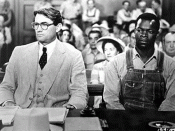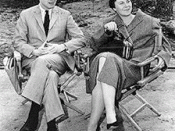"ÃÂTo Kill A Mockingbird' was written by American author Harper Lee. It was the only book she ever wrote.
There are three different themes in this book, tolerance, racial prejudice and childhood. It is the latter theme that I will discuss and give examples of the ways the author conveys the theme of childhood.
The theme of the novel is conveyed by the author's use of plot, setting and characters. One other factor which played a major part in conveying the theme was the way the story was told. From the moment we read the first two or three paragraphs it is instantly recognisable that it is a child narrator looking back on her childhood but remembering events as a child would have seen them at the time.
The plot is very basic but as you read further into the book the story line thickens. The story centres around Scout Finch and her elder brother Jem.
Their life is suddenly turned upside down as they are both forced to grow up rapidly when their father is asked to represent a black man accused of rape. Since the children have to learn to deal with more adult issues they begin to lose part of their childhood. The message of the importance of childhood is continual throughout the novel and it is obviously important to Harper Lee that every child experiences a normal, happy childhood.
"ÃÂTo Kill A Mockingbird' was set in a small town called Maycombe, Alabama in the United States. Scout and Jem live in a small street with a school a short distance away. Their world is incredibly small and with a lot of time on their hands it can be difficult to find something interesting to do, especially with no television. Therefore Scout and Jem had lots of fun making up games to occupy themselves, for instance the episode involving Scout rolling down the street in a large rubber tyre.
I feel that the three most important factors in a happy memorable childhood are attention, innocence and love. Harper Lee illustrates all three in the novel.
The first aspect I will address is attention. Attention is something every child craves and they will do anything to receive it. A mother and father can give a child all the toys in the world but it is no substitute for a child's need of attention. In chapter fourteen of the novel, young Dill had run away from home and turned up in Maycombe to see Scout and Jem. He explains to Scout the reason why he ran away: "They buy me everything I want, but it's now-you've-got-it-go-play-with-it......boys get out and play baseball with other boys, they don't hang around the house worrying their folks."ÃÂ This is a very important point. It shows how very often parents mistake a child's wants from their needs. They believe a child wants attention when in fact they need attention. When a child is denied it they may use measures, like running away from home, to get it.
The second significant factor in a happy childhood is innocence and naivetÃÂé. A young child should be completely unaware of the complicated life adults lead and the different moral issues an adult must struggle with. One issue is racism. In Maycombe there was a great divide between the black people and the white people. When Atticus, Scout and Jem's father, defends a black man accused of rape he not only suffers himself from abuse but Scout does too. She does not know about racism so she asks Atticus: "ÃÂ"Atticus,"àI said one evening, "What exactly is a nigger-lover?"ÃÂ' Scout doesn't understand what a "nigger-lover"àis, so she is naive and innocent about the phrase. She is forced to cope with the barrage of taunts about her father without knowing what was actually intended by them and she gets angry without knowing what the insults mean. A rather more humorous example of Scout and Dill's naivetÃÂé is when Dill has arrived at Scout's house after running away. They are in bed and talking about why he left home, when out of the blue Dill says something which is completely irrelevant to the topic of conversation: "ÃÂ"Scout, let's get us a baby."à"Where?"àDill had heard of a boat that he rowed across to foggy island where all these babies were; you could order one -' I found this incredibly funny as both Scout an Dill were completely oblivious as to where babies came from. As neither of them knew for sure, they used their imagination and invented an idea that many women these days wish was only too true. A child's naivetÃÂé lets their creativity expand and imagination grow, which in itself is an important part of childhood. Childhood should be a time of fun, not a time to worry about adult problems.
Last but not least, love. I feel that this is the single most important factor in a happy childhood. It is obvious to the reader that Atticus loved his children very much, from his actions and what he said. Scout and Jem never knew their mother so Atticus had to love his children even more, which he didn't find very difficult. In the novel, the very last paragraph is probably the one which shows this love of his children the most: "ÃÂHe turned out the light and went into Jem's room. He would be there all night, and he would be there when Jem waked up in the morning.' This extract was in relation to Jem's accident when he broke his elbow whilst protecting himself and Scout from Bob Ewell. This shows how much Atticus loved Scout and Jem. Atticus was willing to sit with Jem all night in case he was needed. He could not bear to leave him on his own in this state.
According to Harper Lee, if a child is not loved and nurtured then things can go badly wrong, as in the case of Miss Mayella Ewell, daughter of Bob Ewell. She had no mother and from an early age she was expected to care for her siblings. She was the girl who accused Tom Robinson of raping her when it was actually she who made advances on Tom. He rejected her so she accused him of rape. The absence, however, of a mother cannot be to blame as Scout and Jem had no problems living only with their father.
A childhood should be a time of fun, happiness and learning how to grow up, not of being unhappy and worried. A major part of ensuring a child lives a happy childhood is the parents involvement with the child. Atticus Finch may not have been the richest man in the world but he loved his children dearly and they loved him back. He cherished every moment he had with them and to Harper Lee and myself this is what childhood is all about.





